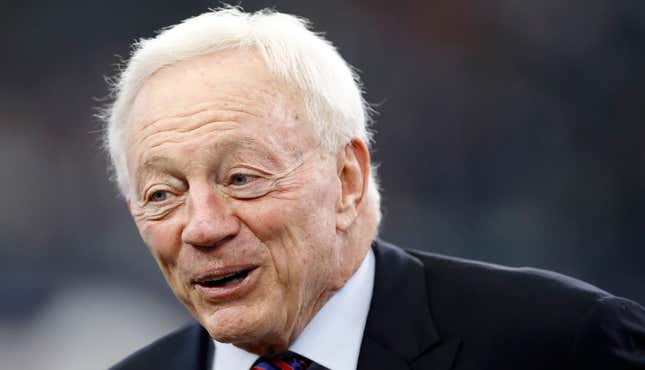
Feeble elbow-skin sculpture Jerry Jones has ramped up his folksy PR campaign against holdout running back Ezekiel Elliott this week, as the regular season draws ever closer and Zeke’s attempt to negotiate a contract extension with ownership appears no closer to an agreement. Jones has already talked himself into hot water with Elliott’s camp—so let’s see if stuffing several other feet into his mouth will somehow clear the air!
Wednesday morning Jones was on 105.3 The Fan, attacking the very concept of player agents in a way that just so happens to dovetail with his bargaining position:
“You eliminate—uh, that’s always been the issue with me and my approach to managing the Cowboys. You eliminate, when you cut out people in between the money and the player. We all know that agents, attorneys, all have their agenda—by the way, they’re all taking money out of the pie, too, when they’re there. And so the straighter it goes from the source to the one receiving it, nine times out of ten, that’s more efficient.
And so I’m a big believer in directly, and I do that everywhere. I get, uh, I don’t have a lot of in-between. I don’t consider Stephen and my family in-between, we’re all on the same page. But anytime you can go directly to the recipient, when you’re the payee, or you’re receiving and you’re talking to the payee, the closer you can get to each other the better chance you got to make a deal.”
Very surprising to learn that a billionaire with a whole structural apparatus designed to protect his financial interests—Jerry famously does not sit in for contract negotiations with players—does not view those functionaries as “in-between,” but does view a person hired to represent players’ interests as an unwelcome obstruction, tainted by their own shady agenda. You start to feel like maybe you can map out why deals get done more quickly when you remove the latter but not the former.
Thursday Jones told assembled media that he’s accepted the likelihood that Elliott will miss a chunk of the regular season, but that he remains confident his running back will be there when he is most needed. In the meantime, he expects the Cowboys to win football games. Per ESPN:
“He can’t and won’t miss them all,” Jones said. “We need Zeke. We’re a better team with Zeke, but we need to be able to win when we need to without players because of injuries, suspension or in this case, holdout. But as I’ve said, this is a marathon.”
It seems as if that relatively optimistic tone—he’ll be there when we need him, in the meantime it’s OK if the negotiation drags into the regular season, everything is fine—may just be reserved for national media. Jones was back on 105.3 The Fan Friday morning, and this time he expressed concern with the basic notion of holding out for an extension while under contract, once again in a way that fails to acknowledge the asymmetrical way this works out in real time:
“When we make contracts, we’ve made contracts with all the other players on the team, and some of those have been made two and three years earlier. But all of it has to have a foundation of depending on your contracts. You have to—in measuring how much you have at any given time, any given month, any given year—you look at the makeup of all the contracts. Well if all of a sudden everybody starts walking contracts, you have no basis of getting anything in an organized way. If they’re moving out as fast as you’re putting ‘em on, then you can’t plan anything.”
Jerry, who by the sound of it was munching on breakfast during this interview, seemed to get this line of thought stuck in his teeth. Moments later, when asked how confident he feels that Elliott will be in game-ready shape when he finally does report, Jones weirdly diverted the conversation all the way back to the principle of honoring existing contracts:
“Well I’ll ask another question for you. If we do a contract, what’s to assure us that this time next year, or three months later, we won’t be talking about another contract? If we’re not gonna honor contracts?”
[...]
“I’m just saying, if you have no basis to have a piece of paper—there’s nothing that says a contract executed within the past few weeks or months can’t be looked at and say ‘you know, I think I want a different part of it done this way’ and not play. You get into a different world when you don’t honor agreements.”
It’s worth pointing out for the umpteen-millionth time that no such code of honor prevents NFL teams from cutting players under contract and wiping out millions of dollars in non-guaranteed salary. For that matter, the entire business model of the NFL in 2019 involves exploiting young players at exactly Elliott’s position and then dumping them before they can cash in on their contributions. Elliott is currently employed under the fifth-year team option on his rookie contract, which can’t really be described as an “agreement” at all, because it is more-or-less dictated by the NFL’s rookie wage scale. Not surprisingly, an awful lot of important context is being obliterated when Jerry starts waxing on about the sanctity of existing deals.